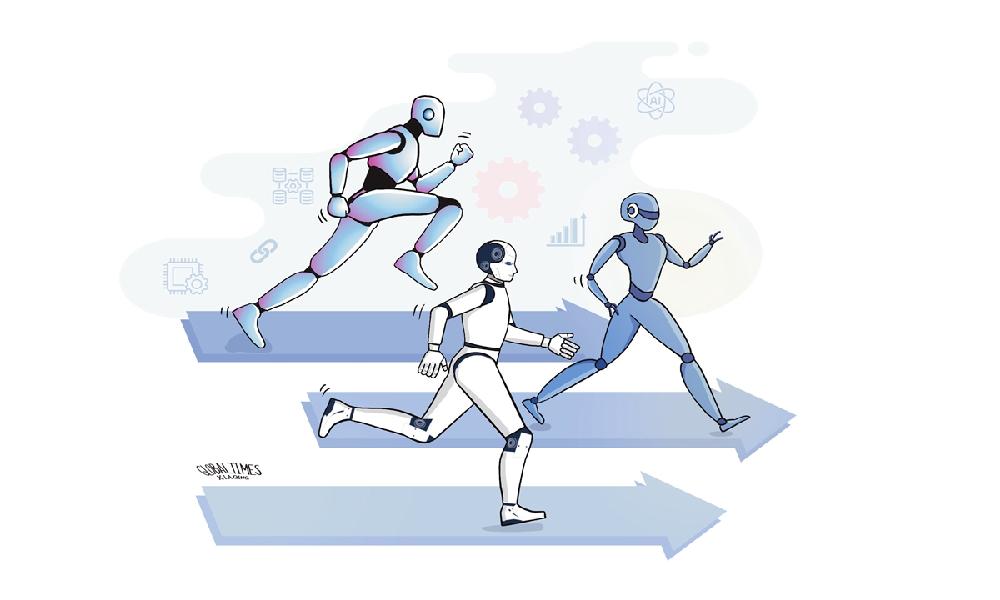
The World Humanoid Robot Games, which are being held in Beijing from Thursday to Sunday, will feature more than 500 robots from 280 teams across 16 countries competing in 538 events, according to the event's official Weibo account. Beyond demonstrating China's technological prowess, the tournament provides an excellent platform for observing industry trends, validating technological pathways, and promoting international collaboration.
The intensive hosting of such events exemplifies China's leap to a higher stage of economic and technological progress, highlighting how innovation-driven development is enabling Chinese industries to secure a more prominent position in the evolving landscape of global industrial competition and cooperation.
After hosting the world's first humanoid robot half-marathon in April and a kickboxing match in May, China is now holding the first World Humanoid Robot Games. This series of "firsts" highlights China's rising prominence as a global leader in humanoid robotics and its continued commitment to driving technological innovation in the field.
Industry analysts view 2025 as a landmark year for advances in robots' movement capabilities. Featuring diverse competitions like football, gymnastics, and dance, the event will fully showcase robots' progress in motion execution, situational adaptability, and human interaction.
Events like the World Humanoid Robot Games carry significant industry and economic implications. There is a mutually reinforcing relationship between higher robot performance and advanced levels of intelligent manufacturing. Enabling robots to run, jump, or perform more complex and precise actions requires production lines to meet higher comprehensive technical standards. In this sense, humanoid robot games serve as a full-scale test of the entire intelligent manufacturing system.
Conversely, as robots' movement capabilities and interactive performance improve, they can better serve a variety of production scenarios, further elevating the overall level of intelligent manufacturing and accelerating industry chain upgrading.
China's robotics industry is advancing rapidly and brimming with opportunities. According to the People's Daily, figures from the China Machinery Industry Federation show that in the first half of this year, industrial robot production grew by 35.6 percent year-on-year. The scale of China's intelligent manufacturing equipment industry is expected to surpass 5 trillion yuan ($697 billion) this year.
More importantly, China's robotics sector has developed a relatively complete industry chain, with notable technological progress in key components and systems. The country is steadily advancing toward higher-level intelligent manufacturing, integrating automation and artificial intelligence (AI) more deeply into production processes. This transition is expected to improve efficiency, lower costs, and foster innovation across multiple industries, further elevating China's position in the global industrial landscape.
The international participation in and media coverage of the World Humanoid Robot Games reflect strong global interest in China's technological advancements. Events like this not only showcase the capabilities of Chinese robotics technologies but also provide platforms for international collaboration and knowledge exchange.
The industrial robot market continues to expand rapidly, leading to increasing competition among countries worldwide. Yet, by emphasizing inclusivity and shared technological benefits, China promotes cooperation rather than zero-sum competition.
China has consistently expressed its commitment to global inclusive cooperation and shared development in cutting-edge areas, including robotics. For instance, on June 30, Foreign Ministry spokesperson Mao Ning stated that China stands ready to work with various countries to advance scientific and technological progress in open cooperation and, through such progress, drive global development and modernization.
The World Humanoid Robot Games in Beijing is more than a technological exhibition; it is a testament to China's strategic vision in intelligent manufacturing. Through events like this, China is advancing its industrial capabilities while promoting global technological cooperation. China's commitment to innovation and collaboration is likely to shape the future of intelligent manufacturing and its role in the global economy.
To fully harness the potential of robotics and intelligent manufacturing, countries need to prioritize inclusive international cooperation that benefits the global community. Collaborative frameworks can facilitate the sharing of research, best practices, and standards, ensuring that technological breakthroughs are accessible and mutually beneficial.
By embracing such a cooperative approach, nations can transform robotics and AI from tools of competition into engines of shared growth, industrial modernization, and societal progress, enabling technological advancements to serve not just individual countries, but the common interests of the global community.
